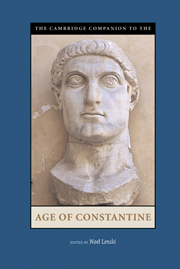Book contents
- Frontmatter
- Introduction
- 1 Sources for the History of Constantine
- Section 1 Politics and Personalities
- Section II Religion and Spiritual Life
- Section III Law and Society
- 8 Bureaucracy and Government
- 9 Civil Law and Social Life
- 10 Economy and Society
- Section IV Art and Culture
- Section V Empire and Beyond
- Appendix 1: Stemmata
- Appendix 2: Timeline
- Maps
- Primary Sources and Translations
- Secondary Bibliography
- Index
9 - Civil Law and Social Life
from Section III - Law and Society
Published online by Cambridge University Press: 28 September 2007
- Frontmatter
- Introduction
- 1 Sources for the History of Constantine
- Section 1 Politics and Personalities
- Section II Religion and Spiritual Life
- Section III Law and Society
- 8 Bureaucracy and Government
- 9 Civil Law and Social Life
- 10 Economy and Society
- Section IV Art and Culture
- Section V Empire and Beyond
- Appendix 1: Stemmata
- Appendix 2: Timeline
- Maps
- Primary Sources and Translations
- Secondary Bibliography
- Index
Summary
That noble man [Constantine], who dearly loved the honorable and who was a most conscientious judge of morals.
Marcian Novels 4.2In ad 454 a constitution of the emperor Constantine, originally issued 118 years previously, was still creating doubt and confusion in the law courts of the Roman empire. Constantine’s ruling, issued on July 21, 336, had targeted senators, perfectissimi and those “adorned” with various high-ranking provincial and municipal dignities who were treating children whom the civil law classed as de facto illegitimate as if they were legitimate. According to Constantine’s law, this newly defined group of elite men were “to become foreigners in the eyes of Roman law” - to lose the protection that their Roman citizenship guaranteed to their (elite) civil status, their (considerable) property, and their (high-class) households - if they attempted to transfer any gifts or inheritances to children not born of a union befitting their rank and dignity. With characteristic precision, Constantine’s enactment catalogued certain “types” of women who by simple virtue of their own civil status (or lack thereof) were to be classed as producing illegitimate offspring with these elite men:
a slave woman, the daughter of a slave woman, a freedwoman, a daughter of a freedwoman, whether made a Roman or a [Junian] Latin, a woman of the stage, a daughter of a woman of the stage, a mistress of a tavern, a daughter of a tavern keeper, a low and degraded woman [humilis abiectaque persona], the daughter of a procurer or of a gladiator or a woman who has charge of wares for sale to the public.
- Type
- Chapter
- Information
- The Cambridge Companion to the Age of Constantine , pp. 205 - 225Publisher: Cambridge University PressPrint publication year: 2005
- 1
- Cited by



